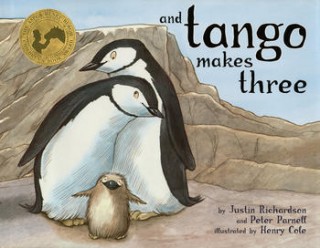July 22, 2014
After protests, Singapore unbans two of the three books it banned
by Bradley Babendir
A few weeks ago, Singapore decided to ban and pulp three children’s books it deemed to be insufficiently pro-family. At the time, the National Library Board announced that it would be destroying the offending books. The titles sent to the chopping block were And Tango Makes Three, The White Swan and Who’s in my Family?, all titles that in one way or another presented something other than a ‘traditional’ family as legitimate.
Thankfully, though, as a result of growing criticism and a protest wherein, according to The Guardian, 400 parents read the books to their children, the National Library Board has decided to reverse its decision.
The reversal did not come swiftly enough to stop the destruction of Who’s in my Family?, but it did save the two others. According to the information minister, Yaccob Ibrahim, the books will be moved to the adult section of the library, as they still feel that the content is inappropriate for children.
And Tango Makes Three, a book that is based on a true story of two male penguins hatching and raising a chick together in a New York zoo, faces much of the same scrutiny in the land of liberty and justice for all. In fact, it faces more scrutiny than almost any other book. Tango was, according the American Library Association, the most challenged book in America for three consecutive years between 2006 and 2008. It fell to number two in 2009 before reclaiming the top spot in 2010. It dropped off the list completely in 2011, before slotting in at fifth in 2012, one spot behind Fifty Shades of Grey.
It goes without saying that the United States Government did not ban And Tango Makes Three, but there is a subset of the population that sees what Singapore did as reasonable—and, in some cases, commendable (though there are, undoubtedly, those who find it merely reasonable).
Again, the book was based on a true story, and it’s not as if it happening in real life did not cause a good deal of controversy in and of itself. The two penguins, Roy and Silo, eventually split up, with one moving on to partnership with a female penguin and the other joining a group of unattached males. When this happened, the right wing group Focus on the Family said, “For those who have pointed to Roy and Silo as models for us all, these developments must be disappointing. Some gay activists might actually be angry.” This prompted gay rights organizations to have to explain that the isolated experience of two penguins living in captivity was not a great way to prove or disprove whether homosexuality was a choice or a birthright.
According to The Guardian, the Singapore government is holding fast that the majority of its citizens are conservative and do not find homosexuality to be acceptable. Instead, Ibrahim is framing the protests and backlash as a demonstration of a “a deep-seated respect” for the written word. Sex between men is still illegal in the sovereign city-state, and punishable by two years in prison. Though it is not being actively enforced, the government refuse to rescind the law.
